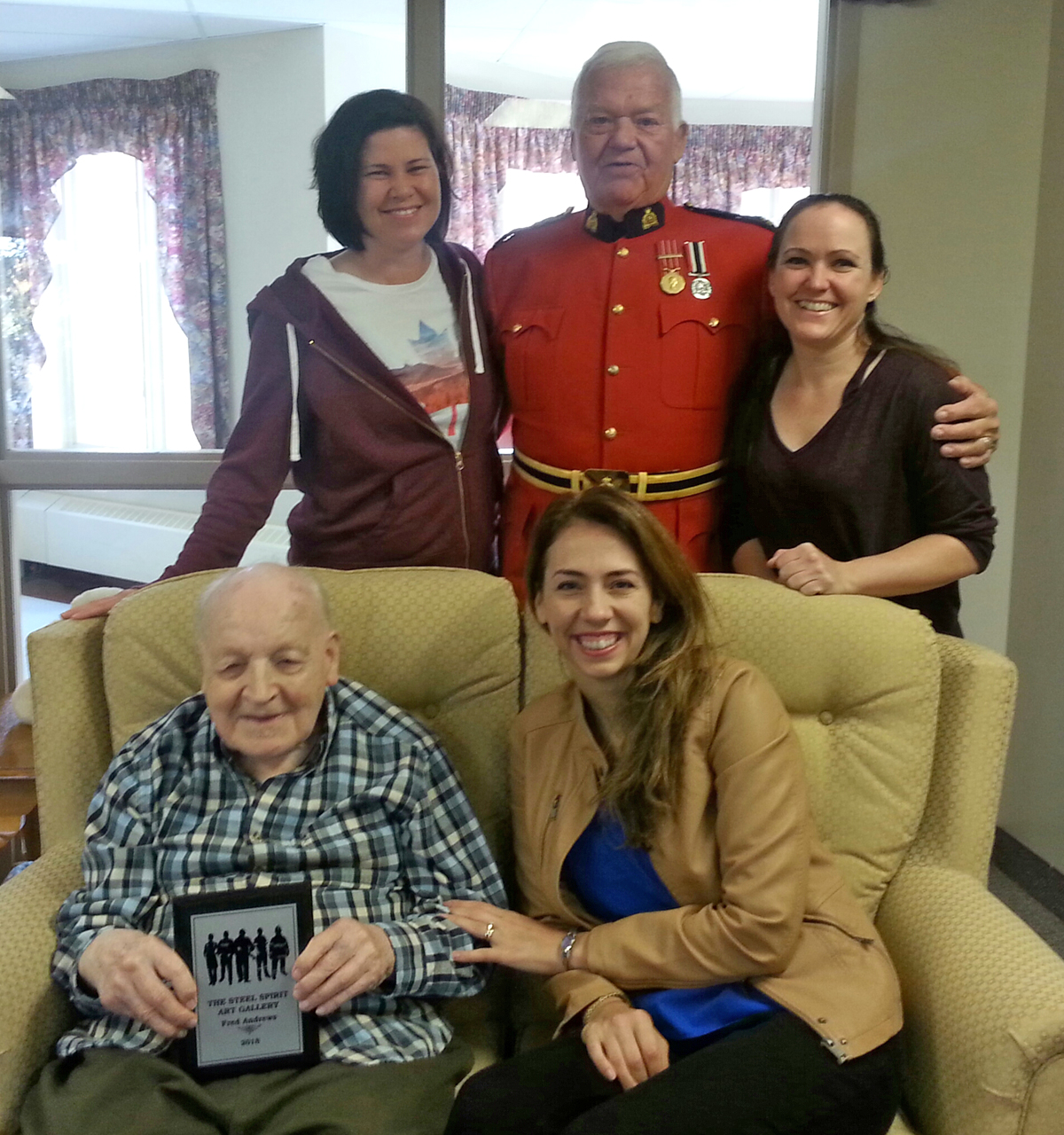Veteran’s poem recalls liberation of Europe
By Lookout on Nov 16, 2020 with Comments 0

Members of The Steel Spirit meet with poet Fred Andrews at Roberta Place Retirement Lodge long-term care facility in Barrie, ON. Back row from left: Trisha MacLeod, Colin Partridge, and Lee-Ann LeMesurier. Front Row: Andrews and The Steel Spirit founder Barbara Brown. Photo credit: Roberta Place
Peter Mallett,
Staff Writer
––
There are two things that help Second World War veteran Fred Andrews remember his military service: a carefully preserved poppy and the poetry he wrote.
The 99-year-old is one of a dwindling population of veterans from that war.
His caregivers at Roberta Place Retirement Lodge long-term care facility in Barrie, ON, say his memory is fading.
His poetry helps him remember, says Anita Crane, his Life Enrichment Coordinator. She is helping Andrews share his story, but says his “incredible poetry” speaks for itself.
Until recently, he was a prolific writer of prose with one of his five books of poems drawing praise from Her Majesty Queen Elizabeth II.
Three quarters of a century ago Andrews was a young man from Trinity Bay, Newfoundland, and a member of the then Dominion’s 59th Heavy Artillery Regiment. The largely unheralded regiment played a key role in the Battle of Normandy and helped liberate France, Belgium, and the Netherlands from German occupation.
His favourite poem The Trail of 59th Newfoundland Heavy Regiment took many years to write and recounts his regiment’s trek across Europe.
“I think of all of his prized possessions he is most proud of this poem,” said Crane. “He wrote that poem over the course of a few years.”
The 1,354 word poem employs a heroic quatrain to recount the regiment, their training, and eventual movement and battles in Europe.
Although poetic, his words offer a rare first-hand account of the 59th Regiment.
When pressed for details about what he saw during the D-Day landings and his regiment’s role in the battle for the City of Caen, Crane says Andrews often falls silent. “He doesn’t like to get into too many details about what he actually saw in the war and the carnage he must have seen,” says Crane. “This is completely understandable because of the lives lost in his own regiment; many men like him have done their best to block this from their memory.”
Preserved Poppy
A fragile, faded red poppy is carefully held inside a cracker wrapper from his rations, and pressed in a book. It was plucked from Flanders Field in Belgium during a fierce firefight between the Germans and the 59th Regiment.
“It just looked so red and so beautiful and peaceful as we were loading guns and firing at the enemy, so it just came to my mind to pick it,” Andrews once told the Toronto Star during an interview in 2010.
He mailed the poppy to his mother while he was in Europe. For many years he thought it had been lost until 1980 following his mother’s death when it was discovered pressed inside a bible. Andrews keeps his poppy in a safe place, but often pulls it out to remember his days with the 59th Regiment and those who never made it home, says Crane.
After the war he met his wife Elizabeth. They both enrolled at Memorial University in St. John’s and earned teaching degrees. The two were married for 51 years and raised twin daughters. Crane says Fred and Elizabeth were inseparable until her death in 2005.
He continued to write poetry in the years following her passing.
While living in Roberta Place he met volunteer Barbara Brown who founded The Steel Spirit, which hosts galleries of artwork created entirely by military, first responders, and hospital practitioners. Brown, a military wife and former paramedic, created the forum to recognize and give back to those that serve their community and country. After learning of his talent as a poet, she invited Andrews to be part of an upcoming art gallery showing in town. While he could not attend the exhibit, his daughters attended the gallery reception where his poem on the 59th Regiment was prominently displayed. Since then, his poem has continued to be on display with The Steel Spirit at more gallery locations.
One of the greatest things about having him join the circle of Steel Spirit artists is how admired he is by the other artists, says Brown.
“It’s the absolute wisdom he carries in his presence with them. On a few occasions over the last two years, the other artists have come with me to the nursing home to meet and talk with Fred. He is so humbled by being part of it all and yet brings such immediate perspective and humour to the room.”
But there haven’t been too many visits this year due to COVID. On Nov. 11, there wasn’t a large Remembrance Day gathering of residents at Roberta Place. Instead, a public address announcement alerted residents to observe the moment of silence; TVs were tuned to the live coverage from the Tomb of the Unknown Soldier.
Residents broke into five cohorts due to the pandemic. Each cohort was permitted to gather for what the Lodge called a Memorial Social. It enabled residents to gather at their nearby nurse’s station with veterans having an opportunity to wear their medals and tell their stories about military service.
The importance of Andrews’ military service and some of the other residents wasn’t lost on Crane or other staff members at Roberta Place.
“I think we owe a huge debt of gratitude to these individuals who fought for our freedom and he is one of them,” says Crane. “For someone like Fred who saw so much destruction and death, to be able to come home from the war and establish a sense of normality and dedicate his life to teaching is really something remarkable.”
––
Excerpt from Fred Andrews’ poem “The Trail of 59th Newfoundland Heavy Regiment”
The weather now was getting coarse
And trench life tried to kill
Our boys with wet and rainy days,
But we proved our native skill.
We made our foxholds near the guns
And sheltered then within tin,
Reinforcing firm and strong
With earth filled cartridge bins.
But this was only a part of it.
And we did fully know,
Here night by night old Jerry barked
From mortars down below.
By now we had cleared Breskens
And shifted from the West,
Moving to front positions
And blasted Hitler’s best.
––
The Steel Spirit is always accepting new artists. Contact thesteelspiritcanada@gmail.com or visit www.thesteelspirit.ca if interested.
––––
Filed Under: Top Stories
About the Author:





